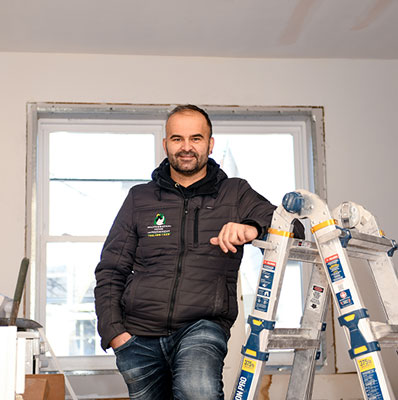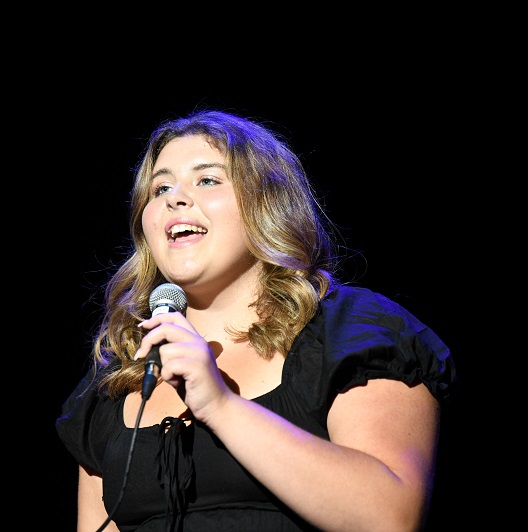ALS Center Provides Comprehensive Resources for Patients

June 19, 2023
At age 63, John “Tom” Libby was always an active person. He enjoyed playing sports, doing minor construction projects around the house and taking his dog, Lucas, for several daily walks in the neighborhood.
In the summer of 2021, Tom noticed that his legs seemed to be growing weaker. Then one day while Tom was out walking Lucas, he stopped to chat with a neighbor. As he was chatting, Lucas spotted another dog down the street. He became overly excited and started to pull at the leash Tom was holding. Tom’s legs suddenly gave way, causing him to sprawl out into the street. “That was when I realized something was going on,” he says.
Tom went to a neurologist, who suspected a neurological disorder. He referred Tom to Mary Sedarous, M.D., director of the ALS Center at the Hackensack Meridian Neuroscience Institute at Jersey Shore University Medical Center—a nationally recognized Center of Excellence by the ALS Association, one of only two in New Jersey. Dr. Sedarous ran a series of tests and eventually diagnosed Tom with amyotrophic lateral sclerosis (ALS), a disease—for which there is no cure—of the nervous system that over time weakens muscles and impairs physical function.
One-stop Shop for Care
After Tom’s initial diagnosis, he felt completely overwhelmed and didn’t know what he should do next. Dr. Sedarous explained to him what the ALS Center could do and helped to expedite his care. “They educated me very quickly,” Tom says. “That gave me a better feeling about being able to live with this disease.”
The ALS Center offers everything an ALS patient might need. “The center brings all the specialties an ALS patient might need together in one place,” says Dr. Sedarous. That may include:
- Neurology
- Nursing care
- Physical and occupational therapy
- Behavioral health
- Respiratory care
- Social services
- Swallow therapy
- Speech therapy
- Nutrition
Tom sees all the necessary specialists in one 3- to 4-hour block. Rather than having to travel to multiple appointments for each of his needs—which can be very difficult for ALS patients—he can combine all appointments into one. Each team evaluates him and gives recommendations on their findings.
The teams anticipate what Tom may need in the future and focus on helping him maintain his quality of life. For example:
- They help him manage his nutrition so that he can maintain his weight to stay strong.
- They provide suggestions on what to eat as his throat muscles weaken.
- They suggest tools like foam attachments to make utensils easier to hold such as forks and spoons, toothbrush, and razor.
- They guide him on exercises that won’t damage his muscles.
- They keep an eye on his respiratory capacity.
Because Tom’s condition is currently stable, he only needs to go to the center once every six months. In the interim, Tom can do a video call or email a nurse if he has questions.
A Hub of Resources
The Center also provides access and connections to a variety of outside sources, including the ALS Association, The Joan Dancy Foundation, Team Gleason, and updates on new clinical trials happening across the country. These connections are important because, as Dr. Sedarous explains, “we want patients to have as much independence as possible.”
The Joan Dancy Foundation helps Tom receive necessary equipment and provides support for families and caregivers.
Team Gleason is a foundation that supports ALS patients and their families. Tom received a grant for an elevated seat on his power chair that Medicare doesn't cover, as well as a speech device that uses eye movement to type out words for when he can no longer speak. Tom also is taking part in voice banking, so when he loses the power of speech and needs to use the speech device, it will sound like him.
The Center stays up to date on ALS advances in research and care through the Northeast Amyotrophic Lateral Sclerosis Consortium (NEALS), allowing ALS patients like Tom to receive the best possible care.
Recently, Jersey Shore’s ALS Center became the first in New Jersey to provide the first treatment to target a genetic cause of ALS.
“All of these resources create a sense of relief for our patients,” says Dr. Sedarous. “Patients realize they aren’t on their own.”
Tom describes the ALS Center as a strong family support system: “It’s like a bunch of good friends that won’t leave me alone,” he jokes, adding that the Center helps keep him in good spirits and hopeful for potential new treatments in the future. “And when I beat this affliction, I will be back on the golf course again.”
Next Steps & Resources:
- Meet our source: Mary Sedarous, M.D.
- Find an ALS Center near you
- To make an appointment with an ALS specialist near you, call 800-822-8905 or visit our website.
The material provided through HealthU is intended to be used as general information only and should not replace the advice of your physician. Always consult your physician for individual care.






